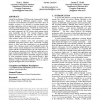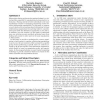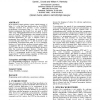26 search results - page 3 / 6 » Cache leakage control mechanism for hard real-time systems |
JSA
2000
13 years 5 months ago
2000
In this article, the problem of finding a tight estimate on the worst-case execution time (WCET) of a real-time program is addressed. The analysis is focused on straight-line code...
IISWC
2006
IEEE
13 years 11 months ago
2006
IEEE
— As CMPs are emerging as the dominant architecture for a wide range of platforms (from embedded systems and game consoles, to PCs, and to servers) the need to manage on-chip res...
ISCA
2007
IEEE
14 years 2 days ago
2007
IEEE
Virtual Private Machines (VPM) provide a framework for Quality of Service (QoS) in CMP-based computer systems. VPMs incorporate microarchitecture mechanisms that allow shares of h...
ACMICEC
2008
ACM
13 years 7 months ago
2008
ACM
Information sharing and protection against leakage is a critical problem especially for organisations having sensitive information. Sharing content between individuals in the same...
OOPSLA
2004
Springer
13 years 11 months ago
2004
Springer
In the domain of hard real-time systems, which language is better: C++ or the Real-Time Specification for Java (RTSJ)? Although standard Java provides a more productive programmin...



